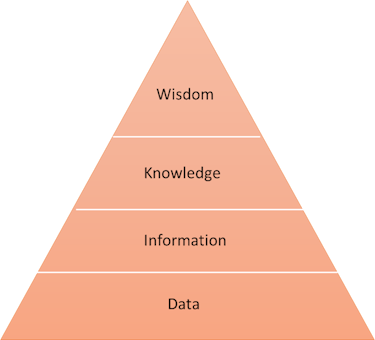McKinsey have produced a report on the role of generative AI on productivity and the future economy. The white paper can be found on their website. They launched the paper with a series of webinars, one of which I attended. Here are my notes and thoughts …
The first point they wanted to make was that they don’t believe it will make programmers redundant. This is not the view of Forbes, who argue that these new machines will reduce the need for human programmers. My limited experience with ChatGPT suggests that its quite good at writing code, although it needed customising before use, but it was not so good at drafting laws, which is curious because as Lessig argues, “Code is Law”.
Historically IT has automated low wage information processing jobs. While information processing is considerably broader than paper pushing, the new generation of AI tools are capable of adding significant value to people working higher up the data, information, knowledge, wisdom pyramid. , such as teachers, lawyers and doctors.
The speakers at my webinar said that life’s getting better, a proposition I question. I add, economic activity still fundamentally requires inputs of labour and capital. It is my contention that software and information systems are difficult to categorise as uniquely belonging to one of these classes of resource. However, to reduce the workforce headcount, it is necessary to increase productivity. Under capitalism, we need to recognise not the benefits of increased productivity are unlikely to go to the workers.
In the light of these macro-economic trends, we also need to consider both those jobs but cannot yet be automated, the manipulation of the real world, and those for whom there is no work, the latter implying that we need to consider our Social Security systems and training/retraining opportunities.
Some creative workers have already raised issues about the use of their copyrighted work to train these AI systems. This is not the last time that our industrial age intellectual property laws come into conflict with the needs of 21st century IT systems. We have seen constant and persistent battles between the DatenKraken and industrial age music monopolies; a political fight that has generally been won by the content owners, claiming a moral case on behalf of the creators. It should be noted that even exceptionally creative programming staff are not paid by royalty and neither are firefighters. Admittedly this is a decision taken by the creators themselves, although the creative industry monopolies have an immense amount of say in the payment models used.
Forbes suggests that, financial services, media & marketing and legal services jobs are particularly vulnerable andn threse industries will be able to take advantage of these new technologies. What they say about legal services shows that the opportunity to use the productivity increases to enable more customers to obtain legal advice may well occur. I’ll be happy if the current generation of virtual assistants could do more than qualify if you need to speak to a human being. Forbes and McKinsey disagree about whether AI systems will impact Life Sciences with McKinsey saying it will and Forbes taking the opposite view. McKinsey also think that AI will impact the Retail sector. They both agree that one of the biggest impacts will be in software engineering, The McKinsey reports has a chart/scattergram plotting impact in dollars vs the proportion of cost i.e. how much and how important are these benefits, the highlight being that software engineering will be heavily impacted. ( I wonder if it will increase the quantity of user authored apps, today, a source of significant risk.)
One of the curious things about this article, is that I was tidying up my office space and came across, my notes of the McKinsey webinar and also a copy of “Don’t Automate, Obliterate”, which I read for the first time in 25 years. It seems less fearful today, I was first introduced to this paper in the 90s, where it was seen as part of a trend to “half the workforce, double the fear, and quadruple the profits”. On rereading, I see it as a call to look at process is in a holistic way and focus on outcomes. Several of Hammer’s examples of effective process redesign come from the early days of the Ford Motor Company, so they weren’t exactly revolutionary processes at the time the paper was published. The big idea that came out of the 90s and automation was supply chain management and EDI. The IT tools being produced required new skills, but not less hours. There seems to be, always more to do. Perhaps it’ll be the same this time.
It’s important that the politicians and regulators get there first. I have already mentioned copyrights, but product liability is another area of concern, and AI will require expert human supervision in the field of the professions for many years to come. Other areas of concern are surveillance, and working hours, both of which should be limited by law. It’s time to #JoinaUnion.
Featured Image Credit: Merrill College of Journalism CC 2012 BY-NC virtual human

I should have mentioned the campaign for the four day week.
I have given this a little polish, I hope it is more readable now and my thoughts on the Hammer article clearer.